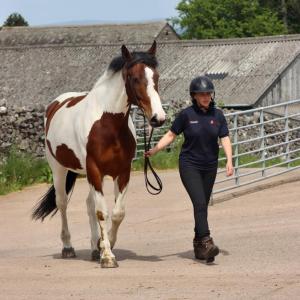
By vet Freya Wood
The summer competition season is rapidly approaching. While planning our competition calendars, let's take a moment to consider some of the ways in which we can protect the health of our horses so we can make the most of the season.

Respiratory infections can have long lasting effects on our horses past the initial disease phase, causing poor performance, a horse requiring weeks off work or yards being placed on lockdown. Risk increases when mixing with horses from outside of the home environment.
Equine influenza is endemic across the world with only a small number of exceptions including New Zealand and Iceland. Similarly to human flu, it causes a harsh dry cough, nasal discharge and a high temperature, with severity depending on the amount of virus the individual is exposed to.
Many will remember equine influenza halting the racing calendar in 2019 as horses mixed, were exposed to the virus and travelled home, taking the virus back to their stable mates. This is the same pattern as is seen at sales and competitions at all levels.
It has been demonstrated that equine influenza can travel huge distances (up to 5km) however vaccination rates in the UK are alarmingly low, with estimated 40% of horses vaccinated. The University of Nottingham examined reasons for poor uptake of vaccination and identified reasons such as not competing in affiliated competitions or never leaving the home premises. However, looking at how the flu virus behaves, these horses would still be at risk.
Like with us, the flu vaccine doesn’t prevent but reduces the severity of flu. Horses require a week off work for every day of a high temperature to allow them to recover, meaning some require months off before being able to return to exercise.
Older equines should not be forgotten when it comes to vaccination. As they age, their immune systems can become less efficient and therefore they need all the protection we can offer them.
Equine herpesvirus made the news during the March 2021 European outbreak where sadly a number of horses died. This disease primarily causes respiratory disease but also causes abortion in pregnant mares and, less commonly, fatal neurological disease.
Herpesvirus behaves similarly to the virus that causes cold sores in people, being dormant in the nerves and reactivating causing clinical signs and shedding virus in times of stress, including travelling and changing social groups. Usually, horses have milder signs than with flu but it can still cause poor performance. Vaccination is also available and is helpful to reduce disease and virus shedding.
But what else can we be doing? Although viruses can travel in the air, basic biosecurity measures can help us reduce risk of these viruses, as well as transmission of bacterial respiratory infections such as strangles which is transmitted by contact with an infected horse or a contaminated surface.
Our biosecurity top tips are:
We would always advocate for vaccination as this is a vital means of optimising health. There is a lot of change in vaccination regulations by competition bodies at the moment so please make sure you have checked the relevant rules for yourself, so you are compliant on the day of competition.